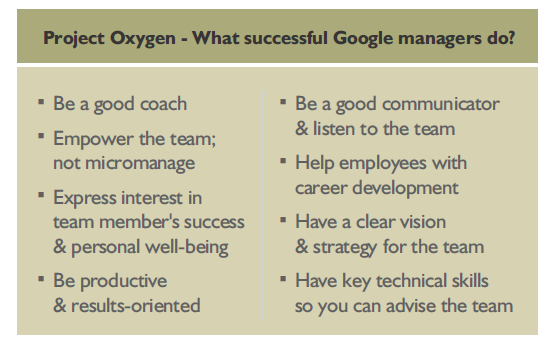.png)
Technology giant Google Inc, with over 40,000 employees worldwide, has earned a reputation of being amongst the most attractive employers globally. Google believes that Mission, Transparency and Voice – the three components of its culture, create a virtuous cycle of attraction, community, engagement and innovation.
Besides innovative offices such as the ski gondolas in the Zurich office, a pub-like meeting room in Dublin and sidewalk cafe in Istanbul; it is the people-centric HR practices that set the company apart. Google's success as amongst the best employers can be attributed to its people management practices which are a result of its use of people analytics.
Re-inventing HR using people analytics
Google follows a data-centric approach to create work environments to help employees to live healthier and more productive lives. Its HR practices are also driven by data, analytics and science. Project Oxygen, which was launched to identify what successful Google managers do, measured key management behaviours using data mined from performance appraisals, employee surveys, nominations for top manager awards and other sources. The people analytics team identified eight key behaviours demonstrated by the company's most effective managers. Google taught these traits in training programs and performance review sessions with individual employees.

Insights-driven people related policies is also mirrored in an engineering-to-product management rotation program introduced, which was an outcome of Googlegeist, Google's annual employee survey, where it solicits feedback on hundreds of issues and then enlists volunteer employee teams across the company to solve the most critical problems.
Open Culture & Transparency
Google's culture emphasises on openness and transparency, and therefore trust in employees. At TGIF, Google's weekly all-hands meetings, Googlers (as the employees of Google are called) ask questions directly to the top leadership and senior executives. To promote transparency, the results of Googlegeist are put up on the intranet.
Empowering Employees
Empowered employees create a more engaged, dedicated and innovative workforce. Google's Bureaucracy Busters' program is designed to reduce internal red tape and make the administrative processes more efficient. Employees have to post their bureaucracy-cutting suggestions on an internal site and vote for the ones they found most promising; the most popular suggestions win.
A Corporate Culture that fosters innovation
At Google, innovation and employee focus go hand in hand. Google's “20% time/Innovation Time Off”, which allowed the Google engineers to spend 20% of their work week on projects that interest them, had led to the development of Google products such as Gmail, AdSense, GTalk, Google Sky, Orkut and Google News.
To quote CEO & Co-Founder Larry Page from an interview to Fortune “My job as a leader is to make sure everybody in the company has great opportunities, and that they feel they're having a meaningful impact and are contributing to the good of society.” This best sums up the people-centric approach in driving innovation at Google.
Publsihed with permission from Engage Sodexo Newsletter, Issue 1.